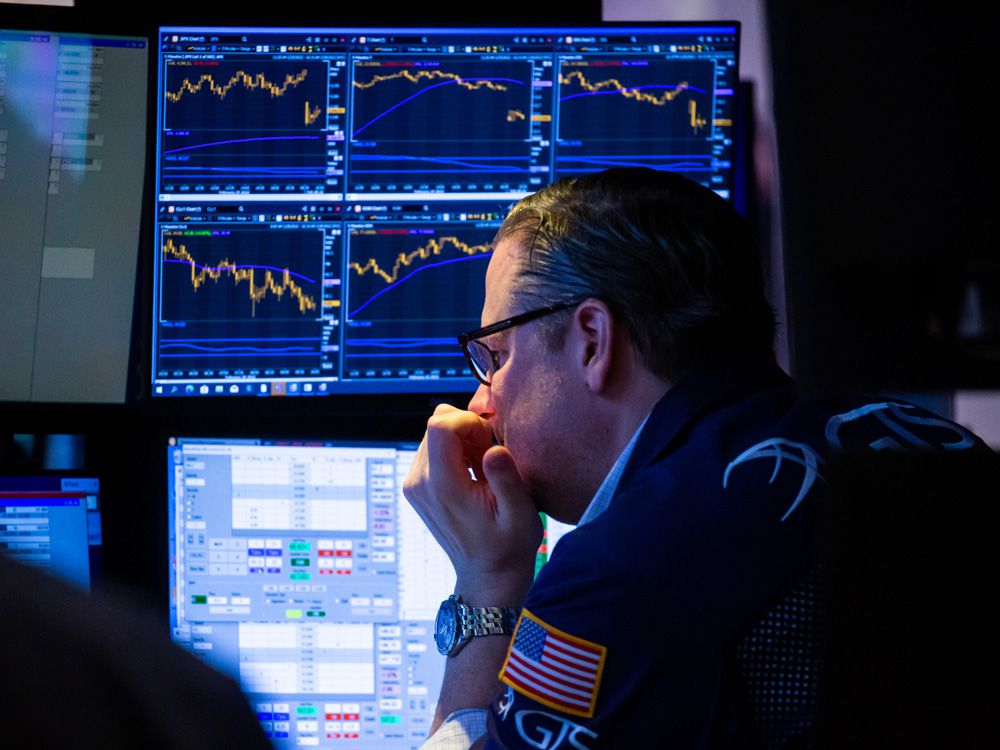Martin Pelletier: There can be tremendous merit in deploying active portfolio management during such turbulent times
Traders work on the floor of the New York Stock Exchange in New York, U.S. Photo by Michael Nagle/Bloomberg files I recently stumbled upon the American Gods television series, a brilliantly written show reflecting upon how technology has replaced society’s gods of old, which couldn’t be more relevant in this post-COVID-19 world.
Advertisement 2 This advertisement has not loaded yet, but your article continues below.
The lockdowns during the crisis only accelerated our dependence on technology, further integrating it within every facet of our daily lives. Technology is also the platform to sell fear, and since fear gathers the most attention and followers, it now dominates much of what we now see and hear.
“People like the idea that love makes the world go round,” Mr. World said on American Gods. “It doesn’t. You don’t lock your doors at night because you love thy neighbour, you deadbolt with reinforced steel because you fear thy neighbour. Fear is order. Fear is control. Fear is safety. Fear is fiction.”
Not surprisingly, this new religion is having quite a negative impact on people’s mental health and overall wellbeing. Americans are now the unhappiest they’ve ever been since the General Social Survey index was started back in the 1970s.
Advertisement 3 This advertisement has not loaded yet, but your article continues below.
Social movements, no doubt, have their purpose and positive intent, but, unfortunately, many have chosen to embrace fear as a means of promotion given its tremendous effectiveness, thereby reinforcing dualistic, traditional black-or-white arguments of salvation or damnation.
For example, one is no longer allowed to believe in the merits of energy security while advocating for environmental protection and climate change. However, certain hypocrisies can be accommodated if the underlying belief system isn’t questioned.
To wit: “The plan: ESG funds will invest in defence companies to make the weapons required to fight wars with hostile regimes we buy energy from, because ESG funds won’t invest in energy companies,” famed entrepreneur, investor and software engineer Marc Andreessen has said.
Advertisement 4 This advertisement has not loaded yet, but your article continues below.
What does any of this have to do with the markets? Well, actually, quite a lot, since human emotion is often in the driver’s seat of the decision-making process. Simply look at all those pension plans capitulating to public pressure and divesting their energy positions, essentially removing a critical inflation hedge for their beneficiaries.
Unfortunately, leaders such as Vladimir Putin, like the Slavic god Czernobog and his bloody hammer, are taking advantage of this idealism by waging a war to reclaim their former power and destabilizing the world in the process.
More On This Topic Three risks that could cause you financial harm in the near future The U.S. poses a serious threat of enticing Canada’s skilled workers to move south Investors want both sky-high returns and the comfort of safety This advertisement has not loaded yet, but your article continues below.
Article content Europe has been particularly exposed given its heavy reliance on Russian oil, gas and coal while it continues to go all in on renewables and, concurrently, decommissioning its nuclear energy capabilities. Meanwhile, United States President Joe Biden, who killed the Keystone pipeline that would have provided a secure source of oil, now has little choice but to seek out oil from hammer-swinging regimes in Iran, Venezuela and Saudi Arabia.
As an investor, it’s important to ask yourself: What are the long-term consequences from this battle between new and old and how are you strategically positioned? Do you have some exposure to commodities within your portfolio and, if not, how best to do so now? What regions and currencies do you have exposure to, and why? What are the risk-management tools being deployed and how do they work?
This advertisement has not loaded yet, but your article continues below.
Article content There can be tremendous merit in deploying active portfolio management during such turbulent times. Having a professional can really help you navigate this minefield of fear, any of which could cause damage and prevent you from achieving your financial goals and objectives.
At least attempt to take a step back every once in a while to try to see things as they really are instead of what others want you to see. It will make you a more tolerant person and a better investor.
“Which way would you walk — the way of hard truths or the way of fine lies?” Neil Gaiman writes in American Gods. “Shadow hesitated. ‘Truths,’ he said. ‘I’ve come too far for more lies.’”
Martin Pelletier, CFA, is a senior portfolio manager at Wellington-Altus Private Counsel Inc, operating as TriVest Wealth Counsel, a private client and institutional investment firm specializing in discretionary risk-managed portfolios, investment audit/oversight and advanced tax, estate and wealth planning.
_____________________________________________________________
For more stories like this one, sign up for the FP Investor newsletter.
______________________________________________________________
Financial Post Top Stories Sign up to receive the daily top stories from the Financial Post, a division of Postmedia Network Inc.
By clicking on the sign up button you consent to receive the above newsletter from Postmedia Network Inc. You may unsubscribe any time by clicking on the unsubscribe link at the bottom of our emails. Postmedia Network Inc. | 365 Bloor Street East, Toronto, Ontario, M4W 3L4 | 416-383-2300
